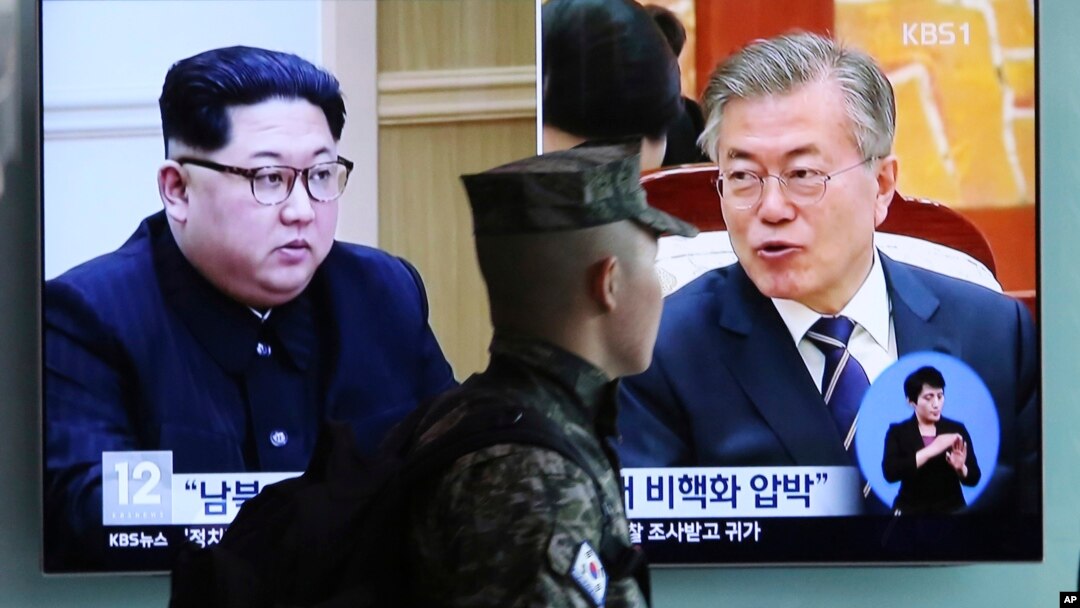South Korean President Moon Jae-in says North Korea is not imposing conditions on upcoming summits with him and U.S. President Donald Trump over banning nuclear weapons from the Korean Peninsula.
“They have not attached any conditions that the U.S. cannot accept, such as the withdrawal of American troops from South Korea,” Moon told corporate executives in Seoul Thursday. “All they are talking about is the end of hostile policies against North Korea, followed by a guarantee of security,” he added.
“I don’t think denuclearization has different meanings for South and North Korea. The North is expressing a will for a complete denuclearization,” Moon said.
WATCH: US Lawmakers Express Hope, Concern Over Trump-Kim Summit
Your browser doesn’t support HTML5
US Lawmakers Express Hope, Concern Over Trump-Kim Summit
He said the dialogue between the two Koreas must continue after the April 27 summit with North Korean leader Kim Jong Un and the North Korea-United States summit, for which no date has been set.
The two Koreas opened a hotline between their leaders Friday, a week before the summit between Kim and Moon in the Demilitarized Zone.
The line, which links the presidential Blue House in Seoul with the Pyongyang office of the North’s State Affairs Commission, which Kim chairs, was used for a test conversation between North and South officials that lasted 4 minutes and 19 seconds.
The hotline is the latest step in an intense diplomatic activity on and around the Korean peninsula, initiated with the Winter Olympics in the South.
Workers plant flowers in the shape of the Korean Peninsula on the lawn to wish for a successful inter-Korean summit at Seoul Plaza in Seoul, South Korea, April 13, 2018. North Korean leader Kim Jong Un will meet South Korean President Moon Jae-in April 27 at the border.
US committed
Moon's assessment of the upcoming summits came as U.S. Disarmament Ambassador Robert Wood said in Geneva the United States "remains committed to complete, verifiable and irreversible denuclearization of North Korea. In terms of the pressure campaign, the things we have been very interested in are maintaining the pressure, meaning enforcing sanctions, ensuring that the North is not able to get access to funds that help further its nuclear and ballistic missile programs."
Wood, the top U.S. envoy to the U.N.-hosted Conference on Disarmament, said the United States believes its international campaign to force an end to North Korea's nuclear weapons development "has had an important impact in the North's decision to return to the table."
He said, "We do not want to go through [the] traditional process that happened over the years where you get this gradual kind of approach that the North eventually goes back on. That is why we are insisting on concrete steps." Wood said the United States is demanding "bold action" from North Korea.
Moon said he sees the potential for a peace agreement with the denuclearization of North Korea and international aid to help North Korea's economy. The two countries are technically at war, with only a truce, not a peace treaty signed after the 1950-53 Korean War.
North Korea has defended its nuclear development and missile tests, in defiance of the U.N. Security Council mandates, as a deterrent to what it sees as a threat from the United States, which has 28,500 troops stationed in South Korea. But it has not launched a missile test since late November, or conducted a nuclear test since last September.
A U.S. Army soldier stands guard in front of the Peace House at the truce village of Panmunjom inside the demilitarized zone separating the two Koreas, South Korea, April 18, 2018.
Long term peace?
Tensions between the two Koreas eased earlier this year when North Korea sent a small group of athletes to participate in the Winter Olympics in South Korea.
Trump struck an optimistic note Wednesday about the possibility of a denuclearized North Korea.
"As I've said before, there is a bright path available to North Korea when it achieves denuclearization in a complete and verifiable and irreversible way," Trump said. "We hope to see the day when the whole Korean peninsula can live together in safety, prosperity and peace."
But he cautioned that if his talks with Kim did not go the way he hopes, he was willing to walk away.
"If we don't think it's going to be successful, we won't have it," Trump said, adding, "If the meeting, when I'm there is not fruitful, I will respectfully leave the meeting."
He also revealed negotiations are under way for the release of three Americans being held by Pyongyang.
Trump said his summit with Kim "will be taking place probably in early June or a little before that, assuming things go well."
Trump also said Seoul has his blessing to try to negotiate with Pyongyang to formally end the 1950s Korean War.
A senior South Korean presidential official said Wednesday the peace talks are a possible subject, but the discussion of formally ending the war would need to involve the other relevant parties.
Active combat in the war ended in 1953 with an armistice signed by the United States, which commanded United Nations forces, North Korea, and China. South Korea was not a signatory, and the two Koreas have never established diplomatic relations.


